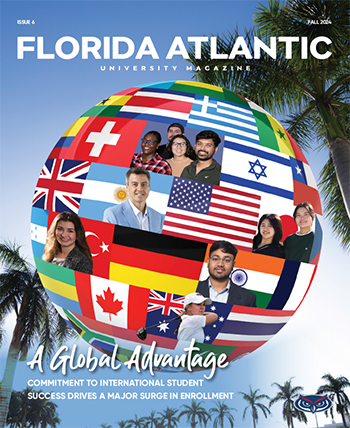The Creative AI Lab allows for human machine collaboration, as well as a seamless physical-to-digital workflow.
1/7/2025
Florida Atlantic: Building the Future
Integrating AI into a School of Architecture
Florida Atlantic University’s School of Architecture is uniquely designed — from its curriculum to its facilities. Unlike most other schools of this nature, it is one step ahead; successfully integrating artificial intelligence (AI) throughout its professional architecture program.
Because of this latest innovative endeavor, the school recently was honored with the Tambellini Future Campus Award for Innovation in Artificial Intelligence and Technology Integration.
"As a School of Architecture, we believe there is an ethical responsibility to prepare students to help shape the future of professional practice," said Joseph Choma, Ph.D., director of the School of Architecture. "It is quite obvious that AI will become a ubiquitous tool within the foreseeable future. Therefore, it is in our opinion, that AI should be learned as a requirement to complete a professional degree in architecture."
The vision of the School of Architecture at Florida Atlantic is to combine innovative research with professional practice constraints. As part of that vision, the school has transformed traditional design studio spaces into new research labs, which are also teaching labs. These include the Creative AI Lab, Environmental Design and Natural Materials Lab, and the Foldable Structures and Materials Lab.
The Creative AI Lab includes an immersive 180-degree floorto- ceiling screen, eight 3D scanners mounted to the ceiling, AR/VR equipment, and a powerful server to compute large datasets instantaneously. The lab is a spatial instrument designed to change the way students think about humanmachine collaboration. For example, students can manipulate physical architectural models, such as tensile fabric structures, by changing boundary conditions. Then those physical models can be scanned in real time, inputted into a self-organizing map and projected on the large immersive screen. The AI can provide a new range of design possibilities, which can then be sent to the AR/VR goggles to help advise the students on how to transform their physical models.
The School of Architecture is one of the first of its kind to require all undergraduate students within their professional program to learn AI at an advanced level, Choma said. Students learn how to create 3D datasets by using self-organizing maps to interpolate that data, and then designing workflows to objectively evaluate the range of possibilities.
"We perceive a fundamental shift in the profession from designing buildings to designing workflows to help tackle wicked problems associated with the built environment," Choma said. "This could include reducing the carbon footprint of how we build or design for climate adaptation and hydrogenerated urbanism. As a school, students and faculty embrace pragmatic constraints as poetic design opportunities, while tackling the most challenging problems of our time."


Undergraduate students watch an AI-generated animation on an immersive screen in the Creative AI Lab.

Undergraduate students interact with the Creative AI Lab.
For more information, email dorcommunications@fau.edu to connect with the Research Communication team.

In 2023-24, School of Architecture faculty members earned multiple awards, including:
- Joseph Choma, Ph.D.: Lab. 2023 ACADIA Innovative Research Award of Excellence from the Association for Computer Aided Design in Architecture
- Jeffrey Huber: 2024 Tau Sigma Delta Gold Medal, awarded to a professional with a record of high distinction in design in the field of architecture, landscape architecture or the allied arts
- Daniel Bolojan: 2024 Digital Futures World Young Award
- Jean Martin Caldieron, Ph.D.: selected as a Fulbright U.S. Scholar for 2024-25 for Cote d’Ivoire
- Four faculty members earned 12 design awards at the 2024 convention for AIA Florida, a chapter of the American Institute of Architects. Jeffrey Huber received nine awards while Daniel Bolojan, Shermeen Yousif, Ph.D., and Dustin White each received one award.

From left, Katelyn Tambellini Ilkani, president and COO of Tambellini Group; Vicki Tambellini, founder and CEO of Tambellini Group; and Joseph Choma, Ph.D., director of Florida Atlantic’s School of Architecture.
